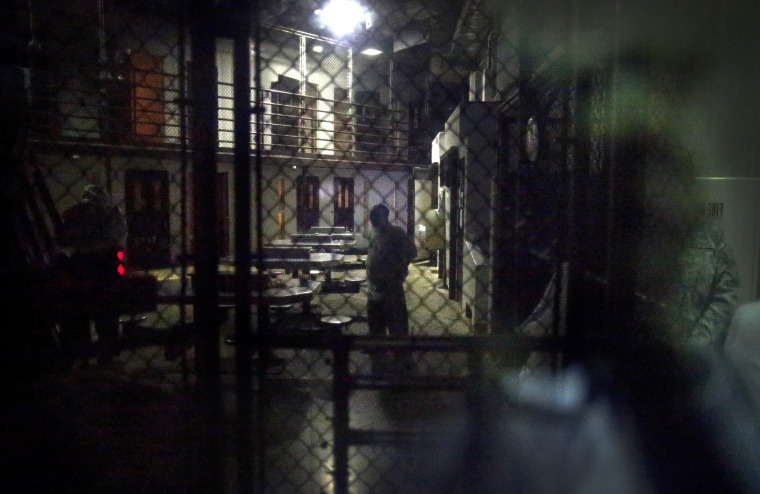Two Guantanamo Bay detainees returned to their home country over the weekend, the Department of Defense announced Sunday. Their release to the custody of the Saudi Arabian government, coupled with the release of two Algerian citizens less than two weeks ago, were signs of progress in the effort to close the decade-old military prison.
Saad Muhammad Husayn Qahtani, 35, and Hamood Abdulla Hamood, 48, once suspected to be members of al-Qaeda and at high risk of rejoining the terrorist network, were taken home by Saudi military jet. Both men were recommended for transfer by a U.S. task force in 2009. Neither had been charged with a crime.
"The United States is grateful to the Government of the Kingdom of Saudi Arabia for its willingness to support ongoing U.S. efforts to close the Guantanamo Bay detention facility,” Paul Lewis, the Special Envoy for closing Guantanamo, said in a statement. Lewis said the transfers occurred with “appropriate security assurances” between the Saudi Arabia and US and were “consistent with our humane treatment policy.”
Qahtani and Hamood are among dozens of Guantanamo detainees who have been transferred to Saudi Arabia to complete a rehabilitation program and then be released.
"The practice of the Saudis sending a jet to pick up their own citizens and putting them through the rehabilitation program is something that's been going on for many years and long predates this administration," Patricia Bronte, a lawyer for Qahtani, told msnbc.
Lewis, the special envoy appointed in October to breathe new life into President Obama’s 2008 campaign promise to close the detention facility, said that the release of the two men to Saudi Arabia represented “real progress” in the administration’s efforts to transfer detainees “despite the burdensome legislative restrictions that have impeded our efforts.”
One hundred and sixty detainees remain at the military installation built on Cuba’s southeastern tip in the wake of the 9/11 attacks. It represents a fraction of the prison’s population at its peak, when it held four times as many people nearly a decade ago. More than half of the current detainees have been approved for release. The administration maintains that it’s had difficulty finding countries willing to resettle the individuals, and the latest Defense Authorization Act – despite being heralded as a step closer to closing Gitmo – includes a Republican-bartered provision banning detainees from trial, detainment, emergency medical treatment, or release in the U.S. through the end of 2014.
Yet the compromise loosens restrictions on the transfer of detainees to other countries, allowing Secretary of Defense Chuck Hagel more leeway to negotiate resettlement with other countries so as long as a review board finds that the detainee does not present a threat to the U.S., while taking into account the influence of terrorist groups in that nation.
The administration repatriated two Algerian citizens less than two weeks ago, marking the first transfer from the base in 21 months (when 11 ethnic Uighurs were sent to El Salvador rather than their native China, where they feared retribution). Lawyers for the Algerian men maintained that their clients also feared for their safety in their home country, which they fled two decades ago amid civil war.
Bronte told msnbc that her client willingly went to Saudi Arabia, where he has siblings.
"My client doesn't like to complain to me about things that are happening to him," Bronte said, but noted that he took part in the massive hunger strike that rocked the military installation this year. She did not know whether he was among the dozen or so men who were force-fed.
But she noted that Qahtani "became a quick favorite with the guards" for his ability to serve as translator between them and the prisoners, often serving as a "mediating influence" between the two groups. Bronte said the 35-year-old learned to speak and write in English from his proximity to the guards and other detainees. Qahtani spent nearly a third of his life at Guantanamo.
Despite coordinated efforts between the two countries to repatriate the men over the weekend, Saudi Prince Turki al-Faisal criticized the Obama administration on Sunday, saying that that “there is an issue of confidence” in President Obama.
“We’ve seen several red lines put forward by the president,” Faisal said, probably in reference to a comment made by Obama about the Syrian government’s use of its chemical arsenal, “which went along and became pinkish as time grew, and eventually ended up completely white.”
Obama scuttled an option to deliver promised missile strikes against the Syrian government after learning of an August chemical attack that left 1,500 dead, including hundreds of children. Instead, the international community has engaged with embattled Syrian President Assad to declare and destroy all of the country’s chemical weapons arsenals.
“When that kind of assurance comes from a leader of a country like the United States, we expect him to stand by it,” Faisal said according to The New York Times. Faisal charged the U.S. and Britain with not doing enough to help the opposition in its effort to topple Assad’s regime. The U.S. suspended nonlethal aid shipments on Thursday after a seizure by rebel factions showed the buildings housing the aid could not be secured. Faisal called the world’s negligence in the three-year-old civil war “almost criminal.”
An ally of the U.S., Saudi Arabia has been chilly about the warming relations between Iran and the United States, including the highest-level direct engagement in decades (when newly-elected Iranian President Hassan Rouhani spoke to Obama by phone) and a temporary deal which allows for some $7 billion in sanctions relief in exchange for inspections of Iran's nuclear site and a commitment to halting the program, which Iranians say is for civilian energy use.
State Department spokesperson Marie Harf chalked Faisal’s comments up to an “easy rhetorical line” during Monday’s daily press briefing, maintaining that when evidence showed that chemical weapons were used in Syria, “We acted.”
